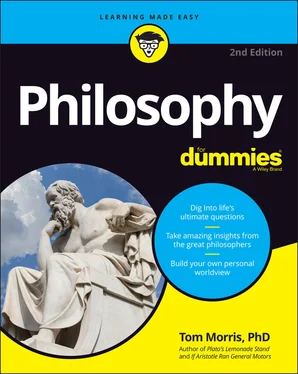Tom Morris - Philosophy For Dummies
Здесь есть возможность читать онлайн «Tom Morris - Philosophy For Dummies» — ознакомительный отрывок электронной книги совершенно бесплатно, а после прочтения отрывка купить полную версию. В некоторых случаях можно слушать аудио, скачать через торрент в формате fb2 и присутствует краткое содержание. Жанр: unrecognised, на английском языке. Описание произведения, (предисловие) а так же отзывы посетителей доступны на портале библиотеки ЛибКат.
- Название:Philosophy For Dummies
- Автор:
- Жанр:
- Год:неизвестен
- ISBN:нет данных
- Рейтинг книги:4 / 5. Голосов: 1
-
Избранное:Добавить в избранное
- Отзывы:
-
Ваша оценка:
- 80
- 1
- 2
- 3
- 4
- 5
Philosophy For Dummies: краткое содержание, описание и аннотация
Предлагаем к чтению аннотацию, описание, краткое содержание или предисловие (зависит от того, что написал сам автор книги «Philosophy For Dummies»). Если вы не нашли необходимую информацию о книге — напишите в комментариях, мы постараемся отыскать её.
Philosophy For Dummies
Philosophy For Dummies
Philosophy For Dummies — читать онлайн ознакомительный отрывок
Ниже представлен текст книги, разбитый по страницам. Система сохранения места последней прочитанной страницы, позволяет с удобством читать онлайн бесплатно книгу «Philosophy For Dummies», без необходимости каждый раз заново искать на чём Вы остановились. Поставьте закладку, и сможете в любой момент перейти на страницу, на которой закончили чтение.
Интервал:
Закладка:
The questions of radical skepticism
The questions of source skepticism in the previous few sections direct your attention to the reliability of the most basic belief-forming mechanisms, or sources for your beliefs. It asks: How do you know that memory, testimony, sense experience, or any other possible sources of your beliefs are ever reliable guides to realities outside yourself? Radical skepticism proceeds differently. It suggests a radical hypothesis or scenario incompatible with a huge array of your typical beliefs, a hypothesis so opposed to what you ordinarily assume that, if it were true, an enormous number of beliefs that you now have would be false. The radical skeptic points out that continuing to hold your normal beliefs requires denying this radical hypothesis and believing its wild alternative scenario to be false. So you seem already committed to its being false. But then, the radical skeptic typically asks how you know or have any evidence to believe that it is false.
Radical skepticism about the past
The 20th-century philosopher Bertrand Russell once posed a radical hypothesis concerning the past that is called “The Five-Minute Hypothesis.” You have beliefs about breakfast this morning, about how you slept last night, about what time you went to bed, about your activities last evening, as well as about what transpired throughout the entire day. You have beliefs about the day before yesterday, and the day before that. Your memory reaches back to last week, and last month, and last year. You have a wealth of beliefs about things that happened decades in the past, perhaps tens of thousands, or even millions of such beliefs. But consider this hypothesis:
The Five-Minute Hypothesis: The entire universe sprang into existence from nothing five minutes ago, exactly as it then was, apparent fossils in the ground, wrinkles on people’s faces, and other signs of age all instantly formed and thoroughly deceptive.
This hypothesis is incompatible with all your beliefs concerning anything you think happened more than five minutes ago. If it is true, all those past-oriented beliefs of yours are false. And the same for me. I have no natural parents, no natural children, I am not really married, I have never signed a contract of any kind, and so on. I never got a philosophy degree. Plato never existed. I have false memories about all these things, memories that sprang into existence along with me and you five minutes ago, or a little longer ago, since you’ve been reading and thinking about it all for a bit now. But nothing existed before that cosmic appearance act roughly five minutes past. Weird. Bizarre. Crazy.
You might object right away, “But how do you know the Five-Minute Hypothesis is true?” If you react like this, your response is natural. The hypothesis admittedly sounds highly implausible, to the greatest possible degree. But that’s not the point. The skeptics who introduce such an idea don’t believe the Five-Minute Hypothesis to be true. And they are not trying to get you to believe it. They are just pointing out that the beliefs you now have commit you to firmly rejecting it as false, and they want to ask how in the world you know it, or even reasonably believe it, to be false.
On examination, it is easy to see that you can’t produce a single shred of good evidence that this ridiculous hypothesis is false. Anything you point to — hair on your head or anyone’s that has been around enough time to grow long, scars from wounds long ago, age circles in tree trunks, and so on — all of this is compatible with the hypothesis, which alleges that all these things, with their deceptive appearances of age, just sprang into existence within the past few minutes, as part of an elaborate cosmic trick.
But if you need some amount of good solid evidence in order to be rationally justified in believing anything, then you can’t rationally believe this radical hypothesis to be false. That wouldn’t mean that you had to believe it to be true. Not at all. It would just mean that you should withhold judgment on it, and become correspondingly uncertain about everything in the past, over five minutes ago. But that would mean giving up all the beliefs you have had concerning things actually having happened in the past. And that would be radical indeed.
Radical skepticism about the present
The thinker often referred to as the Father of Modern Philosophy, René Descartes (pronounced “Renay Day-Cart” ) back in the 17th century offered his own radical suggestion. How do we know that the apparent objective life in the world we experience is not all an extraordinarily elaborate dream? The poet Robert Burns later picked up the idea with his own words, “Life and love are but a dream.” You could be dreaming that you are reading philosophy now. This skeptical reasoning you seem to be reading about could just be part of one big nightmare. Look at the room around you. Gaze down at your body and at what you’re wearing. How do you know that it’s not all just a dream? Modern filmmakers have taken up something like this idea with The Matrix franchise. Or maybe you just dreamed they did.
Descartes also toyed with the idea that present life could possibly all be one big delusion. Perhaps there is a very powerful evil demon who has hypnotized everyone, or just you, in case nobody else but you and the demon actually exist, deluding you to hold all these elaborate beliefs, and to seem to see and hear all the things they or you think are actually being experienced, moment to moment. You likely don’t for a second actually suspect that this might indeed be going on. But, again, why not? Philosopher Thomas Hobbes once referred to “The privilege of absurdity; to which no living creature is subject but man only.” And yes, it’s absurd. But the question is how we know it’s not also real.
The truth is, you cannot refute the Dream Hypothesis, or the Demon Hypothesis, or any such wild, comprehensive Matrix-type scenario. Do you then just live in a virtual, cosmic computer-type simulation? The surprising fact is that when you think about it hard enough, you come to realize that you can’t even come up with a single shred of positive, independent evidence that any of these radical scenarios is false. And yet everyone normally believes things that imply they are, in fact, false. This, the skeptic suggests, is a problem. You need some reason to think you’re right in having your ordinary beliefs, and denying these wild alternatives to be true, and yet you can’t seem to have any.
DESCARTES: REBEL WITHOUT A PAUSE
René Descartes, military man, mathematician, and philosophical whiz kid, was an ultimate intellectual rebel. As an experiment, he decided not to believe anything anyone had ever told him, and not even to trust his own senses. In an attempt to determine whether anything is utterly indubitable, or impossible to doubt, he proposed to try to doubt everything. One thing he concluded that he could not doubt or deny — the fact that in his very act of doubting, he was thinking. And from this, he saw it followed that he must actually exist. Thus he bequeathed to history the most famous piece of philosophical reasoning ever: “I think, therefore I am” (in French, “Je pense, donc je suis,” or in the more famous Latin formulation, “Cogito ergo sum.”). From this foundation, he then began to build up a body of knowledge he thought he could trust absolutely.
Radical skepticism about the future
It’s necessary to take at least the briefest of glances at beliefs about the future. The skeptic’s radical hypothesis here is one invented by a philosopher friend I often saved from the bumpers of oncoming cars in New Haven, Connecticut, years ago (when he wasn’t saving me, as we theorized our way down the sidewalks around Yale), contemporary philosopher and profound thinker J.L.A. Garcia. It’s called Futuristic Nihilism and is very simple.
Читать дальшеИнтервал:
Закладка:
Похожие книги на «Philosophy For Dummies»
Представляем Вашему вниманию похожие книги на «Philosophy For Dummies» списком для выбора. Мы отобрали схожую по названию и смыслу литературу в надежде предоставить читателям больше вариантов отыскать новые, интересные, ещё непрочитанные произведения.
Обсуждение, отзывы о книге «Philosophy For Dummies» и просто собственные мнения читателей. Оставьте ваши комментарии, напишите, что Вы думаете о произведении, его смысле или главных героях. Укажите что конкретно понравилось, а что нет, и почему Вы так считаете.












